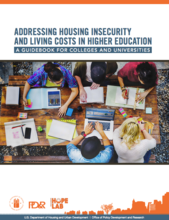1
News Article
Community:
Jul 3, 2018
Researchers have shown — and teachers know — that schoolchildren exposed to neighborhood violence can have a tougher time learning, experiencing more stress and depression than their peers growing up in safe neighborhoods. But a Johns Hopkins University sociologist discovered that the consequences of neighborhood violence reach further than previously known, even spilling over to students who come from safe neighborhoods. Using crime and student data from Chicago, Julia Burdick-Will linked exposure to neighborhood violence to a drop in test scores, an effect that extended to students coming from communities that experienced little or no violence.
Authored by: Moriah Balingit for The Washington Post
Topics: Attendance, Child welfare, Community development, Depression, Education, Health, Low-income, Mental health, Midwest, Out-of-school time, Post-secondary, Racial inequalities, Research, Youth
 Shared by Mica O'Brien
Shared by Mica O'Brien
Mica O'Brien posted a
on Jul 3, 2018
Moriah Balingit for The Washington Post
Researchers have shown — and teachers know — that schoolchildren exposed to neighborhood violence can have a tougher time learning, experiencing more stress and depression than their peers growing up in safe neighborhoods.
0
News Article
Community:
Jul 2, 2018
Poor children don't struggle in school because of their parents. They struggle because of poverty.
Authored by: Mical Raz for The Washington Post
Topics: Attendance, Child welfare, Dual-generation, Early childhood, Education, Family engagement, Food insecurity, Grade-level proficiency, Housing, Legislation & Policy, Literacy, Low-income, Out-of-school time, Post-secondary, Racial inequalities, Research, School-readiness, Youth
 Shared by Mica O'Brien
Shared by Mica O'Brien
Mica O'Brien posted a
on Jul 3, 2018
Mical Raz for The Washington Post
Poor children don't struggle in school because of their parents. They struggle because of poverty.
0
Report
Community:
Nov 1, 2017
Why do some neighborhoods appear able to launch effective local improvement initiatives, while others are more hampered by fragmentation and mistrust? Why can some communities mobilize diverse constituencies to influence public policy, while others cannot? Answers to these questions may be found in the specific patterns of collaboration that form among community organizations, and between these groups, schools, public agencies, and elected officials, according to MDRC, a preeminent social-policy research organization.
Authored by: MDRC
Topics: Asset building, Child welfare, Community development, Data sharing, Dual-generation, Education, Family engagement, Funding, Health, Housing, Legislation & Policy, Low-income, Metrics, Midwest, Mobility, Out-of-school time, Partnerships, Place-based, Preventative care, Research, Safety, Stability, Workforce development, Youth
 Shared by Mica O'Brien
Shared by Mica O'Brien
Mica O'Brien posted a
on Jun 29, 2018
Why do some neighborhoods appear able to launch effective local improvement initiatives, while others are more hampered by fragmentation and mistrust? Why can some communities mobilize diverse constituencies to influence public policy, while others cannot?
0
News Article
Community: Postsecondary
Sep 12, 2016
Authored by: HUD
Topics: Education
 Shared by Cassandra Brooks
Shared by Cassandra Brooks
Cassandra Brooks posted a
on Dec 12, 2017
0
Report
Community: Postsecondary
Dec 1, 2017
Authored by: American Academy of Arts & Sciences
Topics: Education
 Shared by Cassandra Brooks
Shared by Cassandra Brooks
Cassandra Brooks posted a
on Dec 12, 2017
1
News Article
Community:
Nov 6, 2017
Youth Villages is one of the nonprofits highlighted in this year’s annual giving guide released on Monday by the Center for High Impact Philanthropy at the University of Pennsylvania. The center, which researches and promotes charities that offer the most effective social good in specific areas, says one in eight people ages 16 to 24, or 4.9 million nationally, are considered disconnected, meaning that they don’t have a job and are not in high school or college. The rate is considerably higher in rural areas than urban ones. While these numbers have dropped since the depth of the Great Recession, the impact of that economic turmoil is still reverberating.
Authored by: Alina Tugend for THE NEW YORK TIMES
Topics: Foster care, Homelessness, Housing, Workforce development, Youth
 Shared by Abra Lyons-Warren
Shared by Abra Lyons-Warren
Abra Lyons-Warren posted a
on Nov 7, 2017
Alina Tugend for THE NEW YORK TIMES
Youth Villages is one of the nonprofits highlighted in this year’s annual giving guide released on Monday by the Center for High Impact Philanthropy at the University of Pennsylvania.
0
News Article
Community:
Sep 7, 2017
In Tacoma, Washington, and other U.S. cities, housing departments are collaborating with school districts to give low-income and homeless students a leg up.
Authored by: Mimi Kirk for CITY LAB
Topics: CLPHA, Education, Housing, Pacific Northwest, Partnerships, Place-based, Stability
 Shared by Abra Lyons-Warren
Shared by Abra Lyons-Warren
Abra Lyons-Warren posted a
on Sep 7, 2017
In Tacoma, Washington, and other U.S. cities, housing departments are collaborating with school districts to give low-income and homeless students a leg up.
0
News Article
Community:
Aug 10, 2017
Children may love the carefree days of summer, but many parents and educators often worry about the summer break from school. Why? Because, according to the Campaign for Grade-Level Reading and the National Summer Learning Association, students from low-income families lose an average of more than two months in reading achievement during the summer. This serious loss of previously learned skills is called the “summer slide.” What can be done to help maintain academic achievement over the summer for all children?
Authored by: ConnectHome Nation and Age of Learning / ABCmouse
Topics: Education
 Shared by Rebecca Friendly
Shared by Rebecca Friendly
Rebecca Friendly posted a
on Aug 16, 2017
ConnectHome Nation and Age of Learning / ABCmouse
Children may love the carefree days of summer, but many parents and educators often worry about the summer break from school. Why?
0
News Article
Community:
Aug 9, 2017
The doctor’s office is moving into the kitchen.
After years of telling patients to skip junk food and prepare homemade meals, a growing number of doctors and medical groups are now going a step further and teaching them how to cook. Some are building teaching kitchens or creating food pantries right next to their practices. Others are prescribing culinary education programs in hopes of improving their patients’ nutrition and overall health. Some medical schools have even introduced culinary curriculums to train more doctors to talk to patients about food.
Authored by: Donna De La Crus for the NEW YORK TIMES
Topics: Health, Nutrition
 Shared by Abra Lyons-Warren
Shared by Abra Lyons-Warren
Abra Lyons-Warren posted a
on Aug 11, 2017
Donna De La Crus for the NEW YORK TIMES
The doctor’s office is moving into the kitchen.
After years of telling patients to skip junk food and prepare homemade meals, a growing number of doctors and medical groups are now going a step further and teaching them how to cook.
0
Report
Community:
Aug 8, 2017
This report aims to bridge a knowledge gap between the affordable housing and healthcare fields that limits their ability to implement health and housing projects and partnerships. These two sectors have begun to realize how much they overlap, but while great work has been done to expose practitioners in both fields to information about their shared interests and common goals, the results to date have been relatively modest.
Authored by: Prepared by Mercy Housing and The Low Income Investment Fund for THE CALIFORNIA ENDOWMENT and THE KRESGE FOUNDATION
Topics: Cost effectiveness, Dual-eligibles, Health, Housing, Partnerships
 Shared by Abra Lyons-Warren
Shared by Abra Lyons-Warren
Abra Lyons-Warren posted a
on Aug 10, 2017
Prepared by Mercy Housing and The Low Income Investment Fund for THE CALIFORNIA ENDOWMENT and THE KRESGE FOUNDATION
This report aims to bridge a knowledge gap between the affordable housing and healthcare fields that limits their ability to implement health and housing projects and partnerships.
1
News Article
Community:
May 25, 2017
Financial Incentive Offered to Multifamily Borrowers Incorporating Healthy Design Features in Affordable Housing
Authored by:
Topics: Health, Healthy homes
 Shared by Steve Lucas
Shared by Steve Lucas
Steve Lucas posted a
on May 25, 2017
WASHINGTON, DC – Fannie Mae (FNMA/OTC) announced today its Healthy Housing Rewards™ initiative aimed at providing a financial incentive for borrowers who incorporate healthy design features for newly constructed or rehabilitated affordable multifamily rental properties. Healthy Housing Rewards is one of several partnerships that Fannie Mae is advancing as part of a corporate-wide effort called Sustainable Communities Partnerships and Innovation.
Financial Incentive Offered to Multifamily Borrowers Incorporating Healthy Design Features in Affordable Housing
1
Report
Community:
May 1, 2017
State by State Chart
Authored by: ACF
Topics: Early childhood
 Shared by Marsha Basloe
Shared by Marsha Basloe
Marsha Basloe posted a
on May 4, 2017
0
News Article
Community: Youth
Authored by:
Topics: Education, Housing, Low-income, Post-secondary, Racial inequalities, South, Youth
 Shared by Housing Is
Shared by Housing Is
Housing Is posted a
on Apr 27, 2017
0
Report
Community:
Feb 22, 2017
How Students Get to School in Denver, Detroit, New Orleans, New York City, and Washington, DC
Authored by: Student Transportation Working Group for the URBAN INSTITUTE
Topics: Education, Transportation
 Shared by Housing Is
Shared by Housing Is
Housing Is posted a
on Mar 29, 2017
Student Transportation Working Group for the URBAN INSTITUTE
How Students Get to School in Denver, Detroit, New Orleans, New York City, and Washington, DC
0
Report
Community:
Mar 2, 2017
In addition to detailing burdensome regulations, industry groups CLPHA, NAHRO, and PHADA raise concerns about recent MTW Notice and Comment solicitations.
Authored by: CLPHA, PHADA, and NAHRO
Topics: Housing
 Shared by Rich Bindell
Shared by Rich Bindell
Rich Bindell posted a
on Mar 3, 2017
In addition to detailing burdensome regulations, industry groups CLPHA, NAHRO, and PHADA raise concerns about recent MTW Notice and Comment solicitations.
2
News Article
Community:
Mar 2, 2017
Dr. Ben Carson becomes HUD Secretary with 58 to 41 vote in the Senate
Authored by:
Topics: Affordable Care Act, Funding, Health, Housing, Legislation & Policy
 Shared by Steve Lucas
Shared by Steve Lucas
Steve Lucas posted a
on Mar 2, 2017
On March 2, 2017 the U.S. Senate confirmed the nomination of Dr. Benjamin S. Carson, Sr. as the 17th Secretary of the U.S. Department of Housing and Urban Development by a 58 to 41 vote. Dr. Carson’s confirmation followed a relatively non-controversial nomination hearing in January and a straight-forward procedural vote in late February that advanced his nomination to the Senate floor.
Dr. Ben Carson becomes HUD Secretary with 58 to 41 vote in the Senate
0
News Article
Community:
Jan 25, 2017
A reading program designed to help men become better fathers is associated with better parenting skills as well as behavior and learning improvements in kids, a small study suggests.
Authored by: Lisa Rapaport for REUTERS
Topics: Early childhood, East Coast, Education, Family engagement, Literacy, School-readiness
 Shared by Abra Lyons-Warren
Shared by Abra Lyons-Warren
Abra Lyons-Warren posted a
on Feb 6, 2017
Lisa Rapaport for REUTERS
A reading program designed to help men become better fathers is associated with better parenting skills as well as behavior and learning improvements in kids, a small study suggests.
2
News Article
Community:
Aug 20, 2016
Why well-off black families end up living in poorer areas than white families with similar or even lower incomes.
Authored by: John Eligon and Robert Gebeloff for THE NEW YORK TIMES
Topics: Housing
 Shared by CLPHA Admin
Shared by CLPHA Admin
CLPHA Admin posted a
on Jan 5, 2017
John Eligon and Robert Gebeloff for THE NEW YORK TIMES
Why well-off black families end up living in poorer areas than white families with similar or even lower incomes.





 Shared by Cassandra Brooks
on Dec 12, 2017
Shared by Cassandra Brooks
on Dec 12, 2017
 Shared by Cassandra Brooks
on Dec 12, 2017
Shared by Cassandra Brooks
on Dec 12, 2017
 Shared by Abra Lyons-Warren
on Nov 7, 2017
Shared by Abra Lyons-Warren
on Nov 7, 2017
 Shared by Abra Lyons-Warren
on Sep 7, 2017
Shared by Abra Lyons-Warren
on Sep 7, 2017
 Shared by Rebecca Friendly
on Aug 16, 2017
Shared by Rebecca Friendly
on Aug 16, 2017
 Shared by Abra Lyons-Warren
on Aug 11, 2017
Shared by Abra Lyons-Warren
on Aug 11, 2017
 Shared by Abra Lyons-Warren
on Aug 10, 2017
Shared by Abra Lyons-Warren
on Aug 10, 2017
 Shared by Steve Lucas
on May 25, 2017
Shared by Steve Lucas
on May 25, 2017
 Shared by Marsha Basloe
on May 4, 2017
Shared by Marsha Basloe
on May 4, 2017
 Shared by Housing Is
on Apr 27, 2017
Shared by Housing Is
on Apr 27, 2017
 Shared by Housing Is
on Mar 29, 2017
Shared by Housing Is
on Mar 29, 2017
 Shared by Rich Bindell
on Mar 3, 2017
Shared by Rich Bindell
on Mar 3, 2017

 Shared by Steve Lucas
on Mar 2, 2017
Shared by Steve Lucas
on Mar 2, 2017

 Shared by Abra Lyons-Warren
on Feb 6, 2017
Shared by Abra Lyons-Warren
on Feb 6, 2017
 Shared by CLPHA Admin
on Jan 5, 2017
Shared by CLPHA Admin
on Jan 5, 2017




